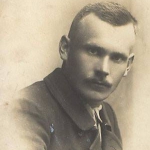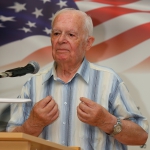Literacy Award in Memory of P. Butenas and A. Kazickas
|
|||
Petras Butenas (1898-1980) was a linguist, an anthropologist, an interpreter and a teacher. He researched Lithuanian language dialects, prepositions, place names, contributed preparing Lithuanian dictionary, wrote the accentuation text book. He was also Alexandra Kazickas' Lithuanian language and literature teacher at the Panevezys High School for Girls. In 2002 Alexandra Kazickas established the award in the honor of her dear teacher Petras Butenas.
Alexandra Kazickas (1920-2011) spent seventy years with her husband Joseph P. Kazickas (1918–2014) and raised five children. They met in Panevezys where sixteen year old Joseph P. Kazickas saw Panevezys High School for Girls student Alexandra Kalvenas for the first time. They've spent most of there lives in the United States with only 20 years in Lithuania, but never lost there love for there homeland. They've lobbied for its freedom during the dark days of the cold war, rejoiced in the re-declaration of its independence in 1990 and worked hard for a better future of Lithuania and its people.
Alexandra Kalvenas – Kazickas graduated from Panevezys High School for Girls in 1937 and kept in touch with many classmates and teachers her entire life. Kazickas family contributed a lot to help Panevezys High School for Girls (currently Vytautas Zemkalnis High School) . In 2001 the Kazickases’ funds helped to renovate school’s attic and turn it into a modern computer library. In 2002 Alexandra Kazickas started the award in the honor of her Lithuanian language and literature teacher Petras Butenas (1898-1980). This award complemented all her other ideas and work in Lithuanian language field. In 2006 with Alexandra Kazickas’ financial support Lithuanian school on Long Island, New York was started and named in her honor. In 2012 in her memory the Kazickas family established Alexandra Kazickas Grant Program supporting Lithuanian Heritage Schools in the US. These schools help preserve Lithuanian language and culture for the benefit of individuals, communities and society. With the AKGP program KFF seeks to support and encourage teachers' productive work, participation at the continuous education conferences, sharing of knowledge and experiences. AKGP was also one of the main initiators of Lithuanian language proficiency assessments conducted by globally accredited institutions in the Heritage language schools which hopefully results in awarding of internationally recognized Lithuanian language proficiency certificates. Alexandra Kazickas also supported Lithuanian musicians, children day centers and schools for children with disabilities.
Since 2018 with this award the Kazickas Family Foundation and the Lithuanian Language Associaton seek to preserve the memory of the linguist Petras Butenas (1896–1980) and his student Alexandra Kalvenaite-Kazickas (1920–2011).
__________________________________________________________________________________________
|
|||
On June 13th, at the Panevezys region Gabriele Petkevicaite-Bite Public Library an award was presented to dr. Bronius Dobrovolskis, an educator, Lithuanian language teaching specialist and textbook author.
During the event the award recipient shared the importance of finding one's teachers in life:
Dr. Bronius Dobrovolskis:
„Not to Fuss Over Student‘s Work Imperfections, but to Celebrate the Progress“
Dear All!
I am sincerely grateful for such deep appreciation of my work. I must confess, this award is such a surprise that it will take some time to adjust.
While accepting this prestigious award, I‘d like to say that my interest in language teaching aproaches and methods, choice to acomplish something more significant in this area started seven decades ago while studying at the Telsiai Teachers Seminary. We had an amazing pedagogy and Lithuanian language methodology teacher Ignas Jurkonis. We, the Zemaiciai (Lithuanian region) dawdlers, were amazed by his temperament that is specific to the Dzukai (Lithuanian region), his fiery teaching aspects. Even today I can still hear his phrases:
to work with all and each and everyone,
to teach, not to accomplish,
mistakes need to be corrected at the crime scene,
reading is expressive, but indistinct,
accentuation caused repetition,
everyone’s hands are raised in the classroom – wonderful! and so
Ignas Jurkonis‘ credo – student must understand the educational purpose of each practice and assignment, learn not just how to do it, but also why it is done this way. He used to talk passionately about his students with such love and respect, his face woud always light up. He embedded in us the need to get to know and understand a child, to show interest in his speech, to develop all methodology projects built around the student‘s mental and physical abilities, to provide the students with many opportunities during the language lessons to discover a joy in knowledge.
True educational workshop laboratory was preparing for the trial Lithuanian language classes. Back then Jurkonis had a tiny office in the school‘s attic – cold, no heat. But we‘d warm up right away there while analyzing the scenario for an upcoming class. We‘d brainstorm how to get child‘s attention without some educational sparkles, but using the specifics of educational resources that help a child to search for the essence of a subject. The teacher really appreciated our efforts to give the students assignments that would encourage them to compare, group, classify, summerize. Together we‘d search for the ways to naturally insert the topics already learned, the foundations that could be layed out for the future subjects.
Such aspects were truly significant to Jurkonis. He persistently encouraged us not to spend the entire class on the students‘ essays grammar corrections, but to dedicate more time to ways on expressing their minds, not to fuss about the imperfections, but to read the noteworthy essays and to provide some good excerpts as the examples, to celebrate student‘s even the smallest progress, even if it‘s just a sentence. And not just of one student, but as many as possible.
I had another not any less prominent teacher. That teacher was my students. I‘ve learned so much from them during my teaching years. Probably I‘ve learned more from them than they‘ve learned from me. Small example. A student completes punctuation assignment – to place the correct punctuation marks in a sentence [grammar specifics particular just to the Lithuanian language explaining student‘s extensive reasoning and his approach from a different perspective]. Isn‘t that a lesson to me, what punctuation assignments I need to choose carefully?
Another lesson. I present students with a sentence from one of the Viktoras Miliunas stories: Spalio pabaigoje kartu su pavėlavusiais paukščiais į kitus kraštus išskrido ir Brigita Viržonytė (At the end of October together with the birds late for another lands left Brigita Virzonyte). There is no need for punctuation in this sentence. But if a student sees such a long sentence, he will certainly find some place for a comma.
Lesson to me again, what sentences are appropriate, how important is to be aware of the student‘s psychology. Thus, I‘ve learned so much from my students and still continue to do so.
Thank you once more for everything.
Bronius Dobrovolskis
Panevezys
June 13, 2019

